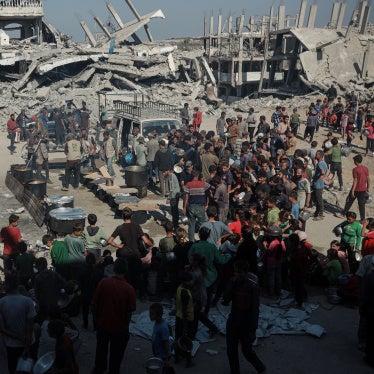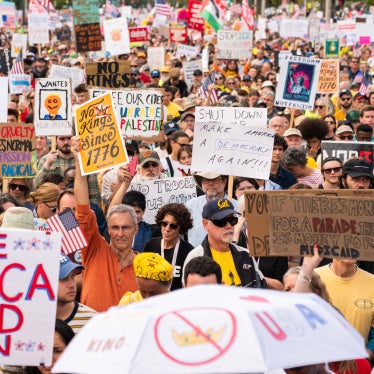(Jakarta) - US President Barack Obama's visit to Indonesia on November 9 through 11, 2010, is an important opportunity to make a stand for free expression, religious freedom, and a rights-respecting, accountable military in Indonesia, Human Rights Watch said today.
During the visit, Obama and Indonesian President Susilo Bambang Yudhoyono are expected to discuss the US-Indonesia Comprehensive Partnership. The partnership addresses bilateral concerns including trade and investment, security and defense, education, health care, and energy, as well as transnational issues such as climate change and humanitarian relief. While Indonesia has made great strides on a number of human rights issues since it emerged from authoritarian rule nearly 12 years ago, serious challenges remain that could undermine Indonesia's stability and democracy in the absence of real institutional reform, Human Rights Watch said.
"Indonesia has made some good progress over the last decade, but that doesn't mean President Obama should ignore other serious human rights problems," said Sophie Richardson, acting Asia director at Human Rights Watch. "Obama should encourage Indonesia to take concrete measures to protect free expression and religious freedom, and to require accountability by the armed forces."
Indonesia has failed to show adequate respect for critical human rights such as freedom of expression and religion, Human Rights Watch said. In other areas where Indonesia has expressed a commitment to change, such as military reform, efforts have stalled. And although Indonesia has made some progress in combating corruption, graft remains a serious problem that impedes progress in fulfilling its human rights obligations.
A February 25 letter from Human Rights Watch to Obama highlighted a number of areas in which he should seek concrete human rights commitments from Yudhoyono. Human Rights Watch urged Obama to call for the release of the dozens of political prisoners, primarily from politically tense areas such as Papua and the Mollucas, imprisoned for engaging in nonviolent demonstrations, raising flags, and displaying pro-independence symbols.
Obama should also call for the repeal of laws that criminalize "insulting" public officials and defamation, which Indonesian authorities have used to silence anti-corruption activists, human rights defenders, and citizens who publicly aired consumer complaints or allegations of misconduct.
He should also call on the Indonesian government to take stronger efforts to protect members of religious minorities from discrimination and violence and to repeal dozens of laws that unfairly restrict the rights of women, discriminate against non-Muslims, and give the government the authority to prosecute people for holding religious beliefs it considers "blasphemous." The religious affairs minister has repeatedly called for an outright ban of the Ahmadiyah, a minority who consider themselves Muslim but whom some other Muslims perceive to be heretics, and violence by Islamist militants against Ahmadi communities has increased.
"Media freedom has improved in Indonesia, but rights-respecting governments do not imprison people for peacefully airing critical views," Richardson said. "Obama should also raise the plight of religious minorities and denounce laws that discriminate against women."
Human Rights Watch urged Obama to call for Indonesia to restore free unhindered access for diplomats, foreign journalists, and human rights groups to the province of Papua, where the Indonesian military and police have frequently committed human rights abuses against civilians with impunity. In May 2009, the government closed the office of the International Committee of the Red Cross in Papua.
The release in October of a video showing the brutal torture of two Papuan men by Indonesian soldiers once again demonstrates the importance of ensuring effective prosecution of human rights violators, Human Rights Watch said. The government has promised to investigate, but Human Rights Watch emphasized that the trial should be open and transparent, charges should reflect the grievous level of torture inflicted, and those bearing command responsibility for these violations should also be prosecuted.
Human Rights Watch also reiterated its call for the government to revive a bill in the Indonesian parliament that would enable the government to prosecute members of the military who commit crimes against civilians before civilian courts, which offer better guarantees of an independent and effective remedy for the victims. Under the present system, such cases are usually handled by the military, with few cases ever making it to a tribunal. In the few cases that do, soldiers frequently face charges that do not reflect the scale of the abuse, and the trials lack transparency.
Human Rights Watch said that the US-Indonesia Comprehensive Partnership should address widespread corruption in the Indonesian bureaucracy and law enforcement system, which drains resources the government could be using to improve public services, including safeguarding the right to health. If, as US and Indonesian officials have suggested, the US intends to provide incentives for Indonesia to preserve its forests as a component of bilateral cooperation on climate change, Obama should press for those incentives to be linked to governance benchmarks, such as improving transparency and accountability in forestry data collection, Human Rights Watch said.
The decision of the Obama administration in July to lift a more than decade-long ban on US training and military assistance to Indonesia's abusive Special Forces (Komando Pasukan Khusus, or Kopassus) has seriously compromised US commitment to promoting respect for human rights in Indonesia, Human Rights Watch said. Kopassus members also remain essentially unaccountable for past violations. At least 11 of 18 Kopassus soldiers that have been convicted by military tribunals for involvement in human rights abuses since 1998 are still serving in the military.
"The Obama administration has yet to realize that rewarding a military that has repeatedly thumbed its nose at accountability for serious human rights abuses is no way to encourage reform," Richardson said. "This US government is essentially rewarding Kopassus for its intransigence and betraying Indonesians who have fought bravely for decades for accountability and justice."
Kopassus was restricted from receiving US military training for over a decade as a result of its involvement in serious human rights abuses in East Timor, Aceh, and other areas. The US should require the following steps by Indonesia before engaging in any training or assistance activity:
- Kopassus should permanently discharge personnel convicted of abuse.
- Kopassus should commit to undertaking credible and impartial investigations of all future allegations of human rights abuse.
- Yudhoyono should establish, and Kopassus should pledge to cooperate with, an ad hoc tribunal to investigate the enforced disappearance of student activists in the late 1990s, as recommended by Indonesia's House of Representatives in October 2009.
Indonesia should also move forward on its commitments to become a party to the Convention on the Protection of All Persons from Enforced Disappearance to help prevent such abuses in the future.
On March 18, four prominent civil society organizations in Jakarta issued a statement calling on Obama to refrain from engaging further with Kopassus until the Indonesian military and government have acted on these three recommendations. Suciwati, the widow of slain human rights defender Munir Thalib, later said: "Indonesia has made much progress on the road to democracy and stability, but enhancing the reach of a powerful military force that lacks respect for the rule of law jeopardizes those hard-fought gains. Obama is rewarding Kopassus without requiring accountability. I fear that the Indonesian security services will again get away with murder."






